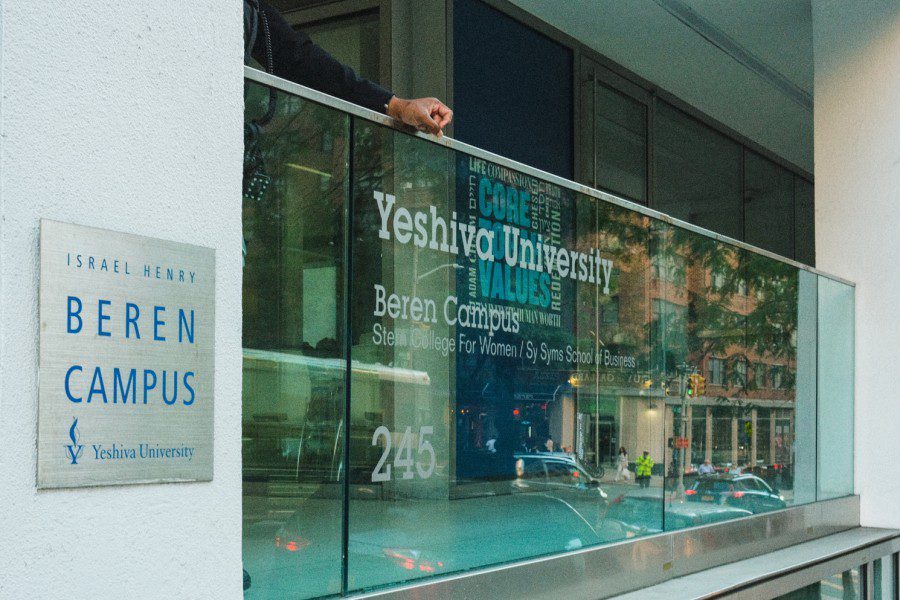Banned LGBTQ+ group strikes compromise with Yeshiva University
Yeshiva University froze all student organization activities after the New York Supreme Court told the university that it could not shut down an LGBTQ+ student group. To prevent further disruption, the club temporarily paused legal efforts against the university.
Yeshiva University and an on-campus LGBTQ+ student organization reached a compromise after all university club activities were put on hold. (Sam Tu for WSN)
September 23, 2022
An LGBTQ+ student organization at Yeshiva University — a private Orthodox Jewish institution in New York City that partners with NYU for several academic programs — agreed to temporarily stop seeking recognition from the university on Thursday, Sept. 22. The decision came after the university stopped all student organizations from operating in response to a U.S. Supreme Court decision which ruled that the university could not shut down the organization — the YU Pride Alliance.
NYU currently partners with Yeshiva University to offer nutrition, science, math and nursing courses for Yeshiva University students. NYU, which publicly offers resources to LGBTQ+ students, did not respond to a request for comment on the status of its partnership following Yeshiva University’s actions regarding the Pride Alliance.
“The institutions that NYU chooses to partner with reflect its own values,” CAS junior Angie Rendon said. “They should find an alternative Jewish university to continue their joint programs with. At the very least, a statement should be put out regarding their position on the situation as it unfolds. The students have a right to know whether or not their university will condone homophobia.”
NYU has previously distanced itself from organizations that have expressed anti-LGBTQ+ sentiments. In February 2021, NYU allowed its contract with Chick-fil-A — which has supported homophobic organizations — to expire after students criticized its presence at Upstein, a dining hall on campus.
Three Yeshiva University students filed a lawsuit in April 2021 on the basis of discrimination after the YU Pride Alliance was not officially allowed to gain recognition from the university. The New York Supreme Court then decided in favor of the Pride Alliance on June 24, which prompted Yeshiva University to appeal to the Supreme Court.
On Sept. 9, the U.S. Supreme Court allowed the university to continue to ban the club pending their complete decision, which came on Sept. 14. In its final decision, the U.S. Supreme Court argued that Yeshiva University had failed to seek relief at state court levels before elevating the case, and returned it to state courts. Two days after the Supreme Court ruling, Yeshiva University shut down all of its clubs in order to avoid formally recognizing Pride Alliance.
The club has allowed the court to pause the order while Yeshiva University continues to fight the decision in New York courts. Student organizations are set to resume after the Jewish holidays, which begin on Sunday. The Pride Alliance said in a statement that they allowed the order to prevent other student organizations from being hurt by the university’s decision.
“YU is attempting to hold all of its students hostage while it deploys manipulative legal tactics, all in an effort to avoid treating our club equally,” the organization wrote. “We are saddened and hurt that the YU administration believes that a group of LGBTQ+ students having a safe place on campus for discussion and support around issues of sexual orientation and gender identity is so objectionable.”
In response to the Supreme Court’s ruling, Yeshiva University released a statement to the university community claiming that as a faith-based university, it can choose which clubs and student spaces align with its values.
“The Supreme Court has laid out the roadmap for us to find expedited relief and we will follow their instructions,” Ari Berman, the university’s president, wrote. “At the same time, as our commitment to and love for our LGBTQ students are unshakeable, we continue to extend our hand in invitation to work together to create a more inclusive campus life consistent with our Torah values.”
An LGBTQ+ Yeshiva University student who was granted anonymity wrote a sworn statement to the Supreme Court of the State of New York about the personal significance the Pride Alliance’s recognition would have for him.
“I have kept my LGBTQ identity secret, or ‘in the closet,’ as it’s commonly termed, because I am terrified of the personal, educational and religious consequences of having my identity known,” he said. “I have no official space where I can gather with other LGBTQ students to form a community, share our similar experiences and provide support to each other.”
Contact Isabella Tapia at [email protected].



























































































































































